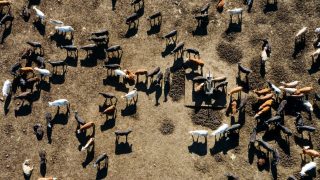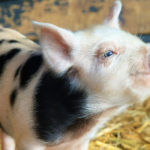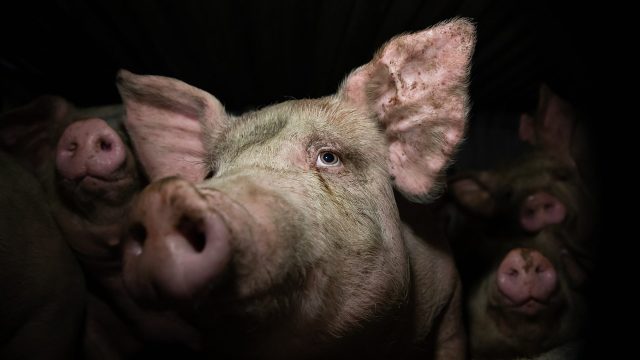
Lawsuit Challenges New NEPA Regulations that Shield CAFOs from Environmental Review
Extreme changes to the regulations have widespread consequences for animals, surrounding communities, and the environment
Contact: media@aldf.org
WASHINGTON, D.C. — Today a coalition of rural advocacy, environmental, and animal protection organizations, led by the Animal Legal Defense Fund, filed a lawsuit against the Council on Environmental Quality (CEQ) for new regulations implementing the National Environmental Policy Act (NEPA) that will shield federally-funded factory farms — known as Concentrated Animal Feeding Operations (CAFOs) — and slaughterhouses from environmental review and limit the ability of the public to know about and challenge the harms caused by these facilities.
CAFOs generate massive amounts of waste, contaminating air, drinking water, and surface waters, and impact the health of both people and animals, all while farmed animals are cruelly confined in small spaces. One way the federal government props up this cruel industry is by providing millions of dollars annually in financial assistance to new and expanding CAFOs and slaughterhouses. Under previous NEPA regulations, federal agencies were required to assess and make public the environmental impact of a new or expanding factory farm or slaughterhouse before any federal funding was approved. CEQ’s new rule allows the government to continue supporting the CAFO industry without accounting for any of the environmental impacts, all the while keeping the public in the dark.
“Factory farms and slaughterhouses already operate with little accountability or transparency for the harm they cause to animals and nearby communities.” says Animal Legal Defense Fund Executive Director Stephen Wells. “The NEPA environmental review provides the public with information about the harms these facilities cause and a chance to speak up before the government helps build and expand factory farms and slaughterhouses in their communities.”
“All too often, the CAFO industry shows up in rural areas without any notice or consideration of how it will impact people’s health or the local environment, injuring residents without any chance for them to be heard or a clear remedy,” said Kelly Hunter Foster, Waterkeeper Alliance Senior Attorney. “NEPA requires that people be considered stakeholders when major projects are proposed in their communities; CEQ’s new regulations attempt to rewrite these clear statutory requirements to shield a major polluting industry from environmental review.”
Without the transparency provided by NEPA’s environmental review, communities may not even be aware of the construction of slaughterhouses and new factory farms, or the expansion of existing ones, until it is far too late.
CEQ’s new rule specifically exempts Farm Service Agency (FSA) and Small Business Administration (SBA) loan guarantees to CAFOs from NEPA review entirely, leaving federal agencies with the ability to guarantee loans for CAFOs that are unable to receive financing anywhere else without having to conduct any environmental review first. Additional provisions in CEQ’s rule could further limit or prevent environmental review of government support for the factory farming industry, including language that could force federal agencies to overlook the climate change impacts of factory farming. CEQ’s new rule also will make it more difficult for members of the public to bring legal challenges when federal agencies fail to adequately review the environmental impacts of the actions, further hobbling communities’ ability to protect themselves.
The coalition includes the Animal Legal Defense Fund, Waterkeeper Alliance, Waterkeepers Chesapeake, Institute for Agriculture and Trade Policy, Iowa Citizens for Community Improvement, and Association of Irritated Residents.
Complaint available upon request.
Sign Up!
Join the Animal Legal Defense Fund's email list to stay up to date on lawsuits, legislation, and regulations affecting animals.
Focus Area
How We Work
Related
-
ALDF Partners with Advocates to Challenge EPA for Discarding Slaughterhouse Water Pollution Rules
10 Organizations petition federal court over EPA’s abandonment of rules to reduce pollution from meat processing industrySeptember 19, 2025 News -
Pigs and Public Health Act Reintroduced in the U.S. House to Prohibit Slaughter of Downed Pigs
Bill will reduce the risk of zoonotic disease transmission and foodborne illness by establishing new standards for non-ambulatory, or “downed” pigsJuly 25, 2025 Press Release -
Lawsuit Filed to Force USDA to Provide FOIA Documents Related to the Beef Checkoff Program
The agency has a history of approving promotional content funded by the program with false and misleading claims about beef’s environmental impactsJuly 17, 2025 Press Release




